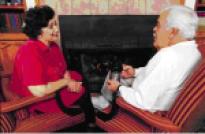 Recently I saw a question on an on-line forum wondering if the questionnaire’s relative should be doing a reverse mortgage. They stated that the relative who is in their mid-60’s and in great health recently remarried a woman who likes expensive things. This relative evidently has a monthly fixed income of $8,000 and an expensive home and wants to do a reverse mortgage. With concern over the new wife “bleeding him dry” they “want to protect him.” They asked for others experience and opinions on reverse mortgages.
Recently I saw a question on an on-line forum wondering if the questionnaire’s relative should be doing a reverse mortgage. They stated that the relative who is in their mid-60’s and in great health recently remarried a woman who likes expensive things. This relative evidently has a monthly fixed income of $8,000 and an expensive home and wants to do a reverse mortgage. With concern over the new wife “bleeding him dry” they “want to protect him.” They asked for others experience and opinions on reverse mortgages.
Now before you go off and start stating this person shouldn’t be doing the reverse mortgage because reverse mortgages are bad and/or expensive or the person should be able to live off of $8,000 a month as replies to the questions stated, read my reply:
There is a lot of misinformation about reverse mortgages. Most articles in the media, politicians, so called “financial advisors” who write and/or comment about reverse mortgages and those mortgage professionals who don’t offer them, friends or neighbors with the statements that they are “bad” are based on their own opinions, not on the facts. They have not talked with those of us in the reverse mortgage industry to get the facts. So don’t base your opinion or decision on these sources.
You don’t go to a plumber if you are having health problems, right? You go to a doctor, and not just a generalist but a specialist in the area of need. Well the same should be true with a reverse mortgage – go to a reverse mortgage specialist to get the facts to make your decision.
See my blog post, “Seventeen Facts about Reverse Mortgages That You May Not Know.”
A reverse mortgage is a mortgage with special terms for seniors 62 and older. Some of the differences include income and credit scores are not considered to qualify and monthly mortgage payments are not required. Rather than a 15 or 30 year term, the loan is due and payable when the home is no longer the primary residence of the borrowers or on the 150th birthday of the youngest borrower. In addition, the reverse mortgage is non-recourse, which means if the loan balance is higher than what the home can be sold for there is no personal liability to the borrower or their heirs. If the home is sold for more than the loan balance, the borrower or their heirs receive the difference.
Often thought of or stated as expensive, the costs are actually comparable to a conventional mortgage except for the FHA Mortgage Insurance Premium. See a side-by-side comparison at “Comparing Reverse Mortgage Closing Costs To A Conventional Mortgage – You’ll Be Surprised They Are Not That Different.” And because the interest rates are historically lower than conventional mortgages, in the big picture the reverse mortgage can be less expensive.
Generally seniors don’t qualify for a conventional mortgage. And even if they do, one needs to consider that payments are required. What happens if “life happens” and one can no longer make the payment? They could be facing foreclosure. I often get calls from those who took out a conventional mortgage and can no longer make the payments and now want to do a reverse mortgage. Unfortunately, I often have to say that there are not enough funds from the reverse mortgage to pay off their current mortgage (a requirement of the reverse mortgage). They would have been better to do a reverse mortgage in the first place.
Now with that said, just like anything, a reverse mortgage is not right for everyone. While there are no limitations on how the funds can be used one should consider if they will have funds to cover taxes, insurance, maintaining the home as well as other needs in the future.
It sounds like in this situation there is more concern about the new wife’s spending habits. Are you or others concerned about the new wife eating away at an inheritance? Because reverse mortgage proceeds use the equity, there may be less inheritance for heirs – this can be considered a negative of the reverse mortgage.
 I would suggest a conversation with your relative to understand their reasons for a reverse mortgage. Is the pension and income paying for the everyday lifestyle but they want extra to enjoy life such as traveling or modifying their home to be prepared for the future? Do they have a financial and estate plan in place? Do they have long term care insurance to cover needs of their future? Have they talked with an elder law attorney to set up a will or trust to determine that the inheritance will go to his heirs and not all go to his new wife?
I would suggest a conversation with your relative to understand their reasons for a reverse mortgage. Is the pension and income paying for the everyday lifestyle but they want extra to enjoy life such as traveling or modifying their home to be prepared for the future? Do they have a financial and estate plan in place? Do they have long term care insurance to cover needs of their future? Have they talked with an elder law attorney to set up a will or trust to determine that the inheritance will go to his heirs and not all go to his new wife?
After helping them get the facts and looking at options, keep in mind it is his decision in the end. You might check out, “Who Are We To Judge How Reverse Mortgage Funds Should Be Used?
Find a reverse mortgage originator who specializes in reverse mortgages (not conventional mortgages) who has experience and will provide you with the facts and details. Look for one who has the client’s best interest in mind, not just their own. Work with one who is local – not doing applications through the mail (for example I originate in Minnesota and meet with borrower’s and their relatives in person.). And see if your relative will allow you to be part of the meetings with the originator and the counseling. “What to Consider When Talking With Reverse Mortgage Lenders” will help you know questions to ask reverse mortgage originators and determine who you should have assist you with a reverse mortgage.
To get facts and details on reverse mortgages, explore my website, http://www.RMSIDAC.com and other articles on my blog, http://www.BethsReverseMortgageBlog.wordpress.com.
© 2009 Beth Paterson, Beth’s Reverse Mortgage Blog, 651-762-9648
This material may be re-posted provided it is re-posted in its entirety without modifications and includes the contact information, copyright information and the following link: http://wp.me/p4EUZQ-tL
Related Articles:
- A Reverse Mortgage Or…? Other Options To Consider
- Using The Reverse Mortgage As A Tool To Strategically Mange One’s Assets
- Finance Retirement With A Reverse Mortgage
- When You Don’t Know What You Don’t Know About Reverse Mortgages
- Is Your Opinion of Reverse Mortgages Denying Seniors?
- How Do We Determine If A Reverse Mortgage Is Not Right For Us?
- Seventeen Facts About Reverse Mortgages That You May Not Know
- Comparing Reverse Mortgage Closing Costs To A Conventional Mortgage – You’ll Be Surprised They Are Not That Different
- Who Are We To Judge How Reverse Mortgage Funds Should Be Used?
- What To Consider When Talking With Reverse Mortgage Lenders
Blog posts’ information is current as of date post published, program is subject to change in in the future. Contact us for current information, 651-762-9648.
This site or the information provided is not from, or approved by, HUD, FHA, or any US Government or Agency.






 I’m sure you have heard the terms “Mortgage Broker,” “Bank” and “Lender,” but do you know the difference? Do you know for which your loan officer or originator works? Do you know how to check on their background? I’m writing this article to clear up the confusion so you learn the difference and the advantages of working with a Reverse Mortgage Broker.
I’m sure you have heard the terms “Mortgage Broker,” “Bank” and “Lender,” but do you know the difference? Do you know for which your loan officer or originator works? Do you know how to check on their background? I’m writing this article to clear up the confusion so you learn the difference and the advantages of working with a Reverse Mortgage Broker.









